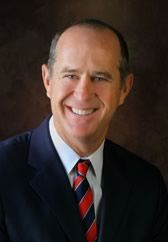Mayor takes on Anaheim violence
By Steven Greenhut
SACRAMENTO — After Tom Tait was sworn in as mayor of Anaheim in November 2010, he issued a statement announcing the city’s commitment to “kindness and freedom.” One reader — knowing this to be the type of governmental hubris that’s almost too easy to lampoon — urged me to reach for the poison pen. I declined. Although the statement struck me as naïve, I cut Tait some slack because of his apparent sincerity.
Two years later, as Anaheim makes national news because of riots sparked by police shootings, Tait is in an unexpected situation of having to put his well-intentioned rhetoric into practice. How he and his city resolve the conflict — whether officials can maintain civic order and dispel violent, chaotic images that seem out of place in the home of the “Happiest Place on Earth” — might offer lessons for cities throughout the country.
As Tait told me in an interview Wednesday, his original intent was to spark a cultural change within city government that encouraged employees to help residents navigate the bureaucracy. He sees kindness and freedom as closely related — i.e., a government that kindly serves the people also is one that creates the broadest latitude for its citizens to live their lives as they choose.
He offered examples of where the two concepts intersect. Shortly after taking over as mayor, Tait learned of a plan by residents in the Colony District to host a Fourth of July parade that included not just the wealthier historic neighborhoods but also a nearby apartment complex. It was a nice idea to bring people together even though they are divided by economic and ethnic differences.
“Someone calls the city, and the official there said they needed a permit, and that’s a fee and a certificate of insurance and approvals,” Tait said. “The parade didn’t happen. … On the other end of the phone, there’s a guy who works for the city, and he has a check list. He goes into government probably to help people, but he has a tight fence put around him.”
Tait also told of how a city security guard gave an elderly man a ride home from City Hall after seeing him struggling in the heat. Tait learned about it because the employee’s supervisor wrote him up — the guard was being punished for doing something outside of procedure. Tait was appalled and was thankful that a department head recognized that the guard should be praised, not punished.
Bureaucratic culture
Changing a bureaucratic culture sounds naïve, perhaps, but, beginning in 2002, Anaheim had gained national attention for putting into place some unusually kind and freedom-friendly public policies that no other major U.S. city had embraced.
Like many older cities, Anaheim wanted to encourage new tax-generating developments. Most cities adopted the government-driven redevelopment approach, in which politically favored businesses are subsidized, and others are driven off their property by eminent domain.
Instead of taking the heavy-handed “hatched in City Hall” redevelopment approach, Anaheim officials banned the use of eminent domain for economic development purposes and then “upzoned” targeted areas, meaning zoning rules were relaxed so that owners had more latitude on what they could do with their land. As a result, the Platinum Triangle area near Angel Stadium boomed as property owners found great value in selling their low-rise warehouses to condo and office developers. It was a market-friendly approach that did not violate anybody’s property rights.
The city also reduced regulations on businesses, issued a business-tax holiday, stopped prosecuting minor code violations as crimes, reduced some misdemeanors to infractions and worked on fostering a more helpful attitude among city workers. Tait, then a councilman, helped build a bipartisan council agenda to advance the reforms.
2000s Motels
In the early 2000s, I wrote for the Orange County Register about Anaheim’s nonsensical rules that forced people who lived in low-cost motels to move out every 30 days.
Officials didn’t like that these old motels were turning into low-income apartments and were making life difficult for some of the city’s poorest residents, even forcing some of them into homelessness. The then-new freedom-friendly city administration took a different approach by working with the motels to assure safe and sanitary conditions and bringing in the Rescue Mission to administer services.
That’s an example of how a changed governmental approach can expand freedom and kindness, Mayor Tait argues.
“I don’t think people are free to be kind in the city because of all the rules, because of the culture and the bureaucracy,” he said. “It’s not about changing the rules, but about changing the culture.” He wants to allow city employees to “use their brains” and not just follow the rules.
Unfortunately, in my view, the city’s Police Department has embraced the wrong kind of policing methods — ones that are unkind and tend to undermine people’s freedom. I don’t see police officials there using their brains to handle a situation resulting, in part, from overly aggressive policing tactics and insufficient police accountability and transparency.
Clearly, the cultural changes the mayor is trying to implement in the city bureaucracy need to filter into the police department — a point Tait also makes. Cops need to get out of their cars and get to know members of the communities where they patrol. They need to put down the riot gear and recognize that, in a free society, police are supposed to protect and serve the public — and must respect the inherent rights of all residents.
I never thought that Tait’s seemingly naïve statement upon becoming mayor would have taken on such significance, but life is funny that way. Despite my cynicism, I agree that reforming a rigid governmental and policing culture is exactly what’s needed in Anaheim, and elsewhere. Fortunately, I can’t think of a more sincere mayor to advance those ideas.
Steven Greenhut is vice president of journalism at the Franklin Center for Government and Public Integrity; write to him at: [email protected]
Related Articles
CA taxes 150% higher than Washington state’s — to what benefit?
A new survey of state and local taxes finds California and New York take the biggest bite out of their
What are Republicans for? Dept.
April 17, 2013 By John Seiler You might have heard the term, “Me too Republicans.” It’s similar to the more
CA Loses $727K on Green Car Flop
John Seiler: Governments almost always lose money when the try to out-guess market demand by investing the taxpayers’ money in





